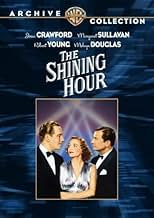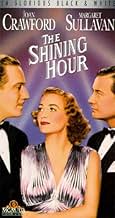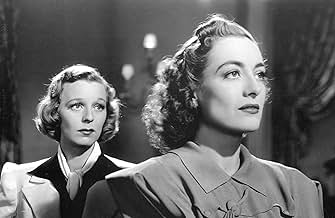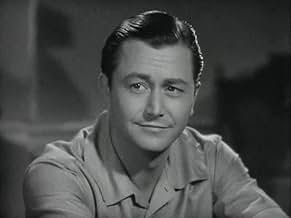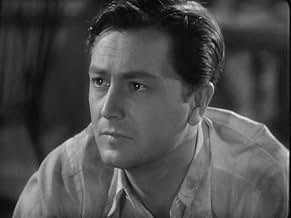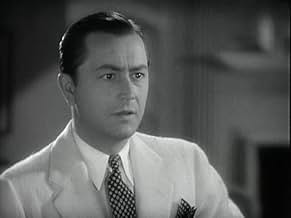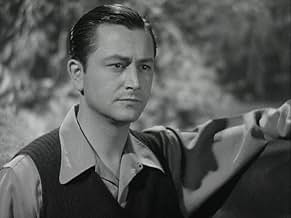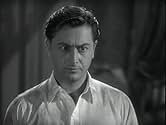IMDb RATING
6.4/10
1.4K
YOUR RATING
A nightclub dancer marries into high society and has to contend with her jealous sister-in-law.A nightclub dancer marries into high society and has to contend with her jealous sister-in-law.A nightclub dancer marries into high society and has to contend with her jealous sister-in-law.
- Awards
- 2 wins total
Granville Bates
- Second Man on Plane
- (uncredited)
Francis X. Bushman Jr.
- Club Sirocco Doorman
- (uncredited)
George Chandler
- Press Agent
- (uncredited)
Charles Coleman
- Henry's Butler
- (uncredited)
Jimmy Conlin
- Man Shaving on Plane
- (uncredited)
Roger Converse
- Hotel Clerk
- (uncredited)
Diane Cook
- Girl at Party
- (uncredited)
Featured reviews
Everybody in this film talks about their feelings (or lack of feelings) in surprisingly articulate ways. The dialogue crackles and the actors are all in top form. Crawford and Sullavan have the best moments, but Douglas, Young and Bainter all create believable characters, too. Not a great film, but an interesting sexual, social and moral snapshot of the era. A must for admirers of Borzage and/or Margaret Sullavan.
I always wanted to see this movie. It was one that Joan Crawford wanted to do after so many mediocre movies in the mid-30's. But I just did not like it. It was based on Keith Winter's Broadway hit but it was probably overly sanitized for the post-1933 censors that did not allow characters to have real problems unless they were killed for their human indiscretions. The cast is tops. Youthful Joan , the lovely Margaret Sullivan, the excellent Robert Young, the charming Melvyn Douglas and the superb character actress Fay Bainter. The script just does not properly develop why these characters especially Bainter's are so conflicted. And Joan seems too mannered in that way that made it look like she was just walking through the part. Not one of Joan's classics but watchable nonetheless. Bainter walks away with it though her character's sudden change at the end does not make any sense.
Joan Crawford disrupts a family in "The Shining Hour," a 1938 film also starring Melvyn Douglas, Margaret Sullavan, Robert Young, and Fay Bainter.
Crawford is Olivia Reilly, a New York City dancer who works in a nightclub with a partner doing an act sort of modeled on Astaire and Rogers though it's clearly down several levels.
Melvyn Douglas is Henry Linden, a gentleman farmer who wants to take her away from all this to Wisconsin, and sick of her present life, she marries him. Arriving on the farm, she finds herself hated by Henry's sister, Hannah (Bainter), lusted after by Henry's brother David (Young) and loved and envied by David's wife Judy (Sullavan).
Before long, David is making overt passes, Henry has figured out David is in love with his wife, and in spite of herself, Judy begins to suspect the same thing.
This film is a little overdone, as it seems like the tension in the house never lets up. David always looks miserable, Judy always looks nervous, Olivia is always trying to be nice except when she's trading barbs with Hannah, and Hannah is nasty.
How any of them stood one another for more than ten minutes is a miracle. We are never allowed to see any happiness.
Also, the entire end of the film is a mess -- Judy takes a ridiculous step to make everything right, but it all goes in the opposite direction.
The most absurd part of the whole film, without giving anything away, is that one of the characters ends up wearing bandages - covering their nose and mouth with only the eyes showing. Now, how is anyone supposed to breathe like that? How did the actor breathe, in fact?
Joan Crawford looks beautiful and is very good in her role as a city slicker who wants to love her husband and environment but is finding it difficult.
Tall, elegant Melvyn Douglas, who thirty years later would emerge as one of the truly great actors in cinema, does a wonderful job as the even-tempered one of the family. For so many years, he played the family friend, the family lawyer, the other man - how, with all that magnificent talent, did he ever stand it?
Robert Young is fine as David, though Margaret Sullavan is so nice and sweet and so much in love with him that he's somewhat unlikable for coming on to Olivia. As the vicious Hannah, Fay Bainter is effective, though I'd have thrown her out of the house.
All in all, it's just okay.
Crawford is Olivia Reilly, a New York City dancer who works in a nightclub with a partner doing an act sort of modeled on Astaire and Rogers though it's clearly down several levels.
Melvyn Douglas is Henry Linden, a gentleman farmer who wants to take her away from all this to Wisconsin, and sick of her present life, she marries him. Arriving on the farm, she finds herself hated by Henry's sister, Hannah (Bainter), lusted after by Henry's brother David (Young) and loved and envied by David's wife Judy (Sullavan).
Before long, David is making overt passes, Henry has figured out David is in love with his wife, and in spite of herself, Judy begins to suspect the same thing.
This film is a little overdone, as it seems like the tension in the house never lets up. David always looks miserable, Judy always looks nervous, Olivia is always trying to be nice except when she's trading barbs with Hannah, and Hannah is nasty.
How any of them stood one another for more than ten minutes is a miracle. We are never allowed to see any happiness.
Also, the entire end of the film is a mess -- Judy takes a ridiculous step to make everything right, but it all goes in the opposite direction.
The most absurd part of the whole film, without giving anything away, is that one of the characters ends up wearing bandages - covering their nose and mouth with only the eyes showing. Now, how is anyone supposed to breathe like that? How did the actor breathe, in fact?
Joan Crawford looks beautiful and is very good in her role as a city slicker who wants to love her husband and environment but is finding it difficult.
Tall, elegant Melvyn Douglas, who thirty years later would emerge as one of the truly great actors in cinema, does a wonderful job as the even-tempered one of the family. For so many years, he played the family friend, the family lawyer, the other man - how, with all that magnificent talent, did he ever stand it?
Robert Young is fine as David, though Margaret Sullavan is so nice and sweet and so much in love with him that he's somewhat unlikable for coming on to Olivia. As the vicious Hannah, Fay Bainter is effective, though I'd have thrown her out of the house.
All in all, it's just okay.
Nightclub dancer Joan Crawford marries Melvyn Douglas, despite the disapproval of his brother, Robert Young. When he takes her back to the immense family farm, there are mixed reactions to her; sister-in-law Fay Bainter hates her, but Margaret Sullavan is friendly. When, however, it becomes clear that Young and Miss Crawford lust for each other, things become dramatic.
The first twenty minutes of this, set in the big city, are excellent, with the cocktail set the brothers associate with having many catty remarks to make about La Crawford, and Young certainly plays grumpy well. Once it gets to the country, however, this turns into a Code-compliant, Peyton Place film, and those two simply do not mix well. Everyone does well in their roles, although Douglas isn't given much to do, and only Miss Sullavan is excellent. Crawford had wanted her for the role, and Mayer had tried to talk her out of it, pointing out that Miss Sullavan would steal the show. Miss Crawford responded that she would rather be a supporting player in a great movie than a lead in a stinker. This one is neither, but although I enjoyed it a lot, I don't think it's a very good film.
The first twenty minutes of this, set in the big city, are excellent, with the cocktail set the brothers associate with having many catty remarks to make about La Crawford, and Young certainly plays grumpy well. Once it gets to the country, however, this turns into a Code-compliant, Peyton Place film, and those two simply do not mix well. Everyone does well in their roles, although Douglas isn't given much to do, and only Miss Sullavan is excellent. Crawford had wanted her for the role, and Mayer had tried to talk her out of it, pointing out that Miss Sullavan would steal the show. Miss Crawford responded that she would rather be a supporting player in a great movie than a lead in a stinker. This one is neither, but although I enjoyed it a lot, I don't think it's a very good film.
Contrary to most of the opinions I read here, I did not find this film "soapy." I found it, refreshingly, a film for adults. For me, that's all too rare. I think it's about what relationship is, what love is and isn't, and most of all about the experience it takes and the resulting wisdom to build relationship beyond an adolescent understanding of love and attraction. And the great value of the self-knowledge that results. For me, that adult perspective was so refreshing and so rare that it beats out every other consideration. (Especially given the idiotic popular fare we're used to these days which substitutes a junior high school age cynicism for the difficult work of love.) Along with, say, "Dodsworth," for some reason Hollywood in this period was capable of some genuinely mature work for adults. The popular culture could use a little more. With Ogden Nash in the writing credits, I shouldn't be surprised at what I found valuable in this film.
Did you know
- TriviaJoan Crawford specifically asked for Margaret Sullavan to play the role of Judy, despite Louis B. Mayer's warning that the accomplished stage actress could steal the picture from her. Joan replied "I'd rather be a supporting player in a good picture than the star of a bad one."
- Quotes
Judy Linden: Hannah's quoting the bible again. One of these days we're going to put her in all the hotel rooms.
- ConnectionsFeatured in Joan Crawford: The Ultimate Movie Star (2002)
- SoundtracksWaltz in C sharp minor, Op.64, No. 2
(1846-47) (uncredited)
Written by Frédéric Chopin
Played at the nightclub for specialty dance by Joan Crawford and Tony De Marco
Reprised by Robert Young on piano; also played by him in a jazzy version
Incorporated as part of the score
- How long is The Shining Hour?Powered by Alexa
Details
Box office
- Budget
- $1,068,000 (estimated)
- Runtime1 hour 16 minutes
- Color
- Aspect ratio
- 1.37 : 1
Contribute to this page
Suggest an edit or add missing content



